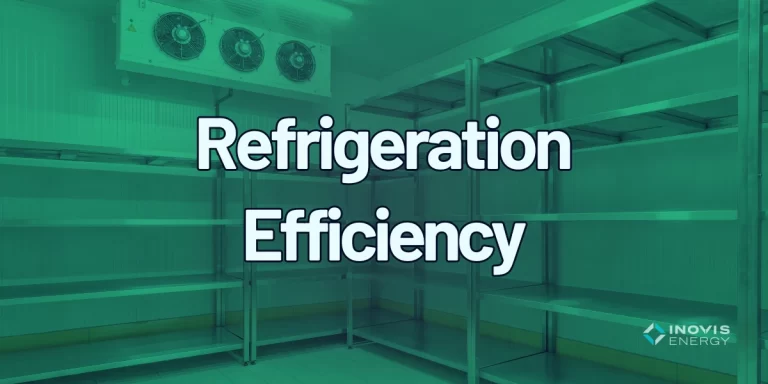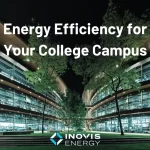Refrigeration Efficiency Upgrades for Commercial and Institutional Facilities
Home » Solutions » Energy Efficiency » Refrigeration Efficiency
Refrigeration is essential for food service, healthcare, and many institutional settings—but it can be a major source of energy waste. This page outlines smart upgrades that improve system efficiency, reduce operating costs, and extend equipment life.
Table of Contents

What is Refrigeration Efficiency?
Refrigeration systems—walk-ins, reach-ins, display cases, and cold storage rooms—can account for a significant portion of a facility’s energy bill. Many systems run 24/7 and suffer from aging equipment, inefficient motors, and uncontrolled defrost cycles that drive up utility costs.
Refrigeration efficiency upgrades involve targeted improvements to components such as:
-
Evaporator and condenser fans
-
Compressor control systems
-
Anti-sweat heaters
-
Defrost controls
-
Case lighting
-
Doors and gaskets
Implementing efficiency measures or upgrading these components reduce unnecessary runtime, improve temperature stability, and cut refrigeration energy use by up to 50% depending on the system’s age and use.
Why Improve Your Refrigeration Systems?
Key Benefits:
-
Cut refrigeration-related energy use by 20–50%
-
Extend the life of coolers, freezers, and compressors
-
Improve temperature control and product safety
-
Reduce wear-and-tear on motors and compressors
-
Prevent food spoilage or temperature excursions
-
Lower maintenance costs
-
Qualify for utility rebates on motors, controls, and replacements
How Refrigeration Efficiency Upgrades Work
Each upgrade targets a specific inefficiency in the refrigeration cycle:
-
Evaporator Fan ECMs: Replace constant-speed motors with efficient, variable-speed units
-
Anti-Sweat Heater Controls: Reduce heater usage based on humidity levels
-
Defrost Controls: Prevent unnecessary defrost cycles using smart sensors or timers
-
Variable-Speed Compressors: Adjust cooling output based on actual load
-
Lighting Retrofits: Add LED case lighting with motion sensors
-
Gasket & Door Replacements: Minimize infiltration of warm air
-
Destratification Fans: Improve cold air distribution in walk-in coolers
Together, these measures reduce compressor cycling, energy loss, and overheating—while keeping products safe and equipment running efficiently.
How Refrigeration Upgrades Save Energy
Most legacy systems operate at full power all the time, regardless of load. Upgrades like ECMs and variable-speed compressors allow the system to scale its output, cutting waste during off-peak times.
-
ECMs reduce fan energy use by up to 75%
-
Anti-sweat heater controls cut heater load by up to 70%
-
Smart defrost limits unnecessary heating and cooling
-
Lighting retrofits cut heat load inside cases, reducing compressor runtime
In total, facilities can see paybacks in 1–3 years, with the added benefit of utility incentives and improved product reliability.
Industries That Benefit from Refrigeration Efficiency
Grocery stores, convenience stores, schools, healthcare facilities, restaurants, food distribution centers, cold storage warehouses, and any facility with large or multiple refrigeration units.
Our Installation Process
-
System Inventory – Audit all refrigeration units and components
-
Monitoring & Measurement – Record baseline performance and energy use
-
Upgrade Planning – Identify which motors, controls, or cases need replacement
-
Rebate Mapping – Match each measure to local utility incentives
-
Installation – Perform retrofits or replacements with minimal downtime
-
Validation & Optimization – Confirm temperature setpoints and monitor savings
Financing Options for Refrigeration Efficiency Projects
Many refrigeration measures are eligible for prescriptive or custom utility rebates, including ECMs, controls, and case replacements. Inovis handles the application process and often applies rebates as upfront discounts.
Financing structures include:
-
On-bill financing
-
Bundled upgrades with lighting or HVAC
-
Pay-from-savings models for larger portfolios
Refrigeration upgrades are often cash-flow positive from month one due to their 24/7 energy reduction impact.
Cut Refrigeration Costs Without Compromising Safety
Don’t let outdated refrigeration equipment drain your energy budget. Inovis helps commercial and institutional facilities reduce refrigeration costs with targeted upgrades and expert rebate support.

